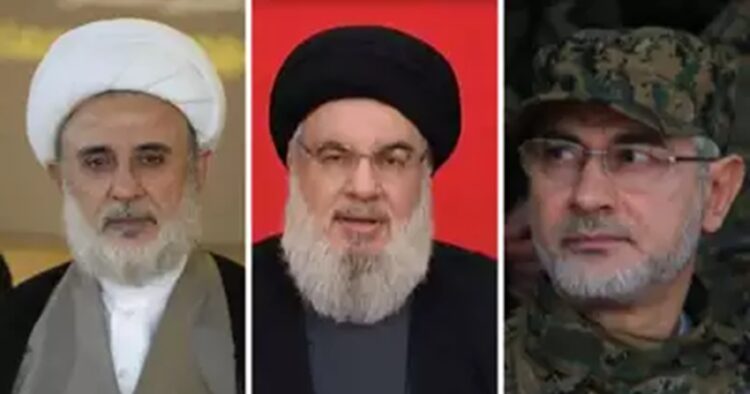In just a week in a series of targeted strikes, Israel has escalated its actions against Hezbollah, resulting in the deaths of top seven commanders, including its leader, Hassan Nasrallah. This escalation comes after Hezbollah joined the forces with Hamas in Gaza, following the latter’s surprise attack on southern Israel.
The loss of these members, have been with Hezbollah since its inception in the early 1980s, presents a challenge for the organisation, which is considered Lebanon’s most military and political force. Among those killed were Nabil Kaouk, a veteran commander who joined Hezbollah in the 1980s and was seen as a potential successor to Nasrallah.
The seven commanders eliminated by Israeli Strikes:
Nabil Kaouk
A day after the death of Hezbollah leader Hassan Nasrallah, Israel has killed another high-ranking Hezbollah commander, Nabil Kaouk, in an airstrike.
Nabil Kaouk was a veteran of Hezbollah, having joined the organisation in the 1980s. The United States had imposed sanctions on him in 2020 for his involvement in Hezbollah’s military operations in southern Lebanon.
Kaouk also served as Hezbollah’s military commander in south Lebanin form 1995 until 2010. He made several media appearances and gave speeches to supporters, including in funerals for killed Hezbollah militants.
Ibrahim Aqil
Senior Hezbollah commander and head of the elite Radwan forces, Ibrahim Aqil was killed in an Israeli airstrike on Beirut’s southern suburbs.
Aqil was planning as assault on Israeli territory, with the goal of penetrating and attacking communities in the Galilee, said Israel Defence Forces. The IDF added that this objectives were similar to those of Hamas during the October 7 attacks.
Ahmad Wehbe
Wehbe was a commander of the Radwan Forces and played a significant role in developing the group since its formation almost two decades ago. He was killed alongside Akil in an airstrike in Beirut’s outhern suburbs that struck and leveled a building.
Ali Karaki
Karaki led Hezbollah’s southern front, playing a key role in the ongoing conflict. The US described him as a significant figure in the militant group’s leadership.
Mohammad Surour
Surour was the head of Hezbollah’s drone unit, which was used for the first time in this current conflict with Israel. Hezbollah launched exploding drones deep into Israel, penetrating its defense systems which had mostly focused on the group’s rockets and missiles.
Ibrahim Kobeissi
Top Hezbollah commander Ibrahim Mohammed Koveissi died in an Israeli strike on South Beirut. Kobeissi led Hezbollah’s missile unit.
According to the IDF, Kobeissi planned the kidnapping and murder of three Israeli soldiers at the northern border in 2000, whose bodies were returned in a prisoner swap with Hezbollah four years later.

















Comments